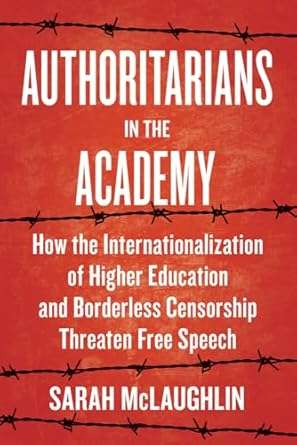The Volokh Conspiracy
Mostly law professors | Sometimes contrarian | Often libertarian | Always independent
"Authoritarians in the Academy": The Free Speech Recession
When universities are global institutions, the global speech environment matters.

In my new book Authoritarians in the Academy: How the Internationalization of Higher Education and Borderless Censorship Threaten Free Speech, I argue that higher education must adapt to protect its values as a global industry in an unfree world. The excerpts I'll feature in this week's guest posts will detail how universities have faced challenges to their values in the international education space, and how some have failed.
First, I'd like to set the scene for the global environment in which universities operate today.
Millions of students move across borders to pursue their academic careers. Universities operate study abroad programs in nations all over the world. Partnerships and grants tie together universities, corporations, institutions, and governments overseas. In some cases, universities even choose to establish joint institutions and satellite campuses thousands of miles away from their flagship campuses. Often they do so in countries with vastly different legal systems and established speech protections.
No industry—from fashion to tech to sports—is immune to the pressures it operates in, but when it comes to the institutions we rely on to help us accurately understand, research, and debate the world we live in, it matters when they are vulnerable to authoritarian censorship.
As American higher education has become more worldly, what kind of world is it operating in? One that is deeply unwelcoming toward free expression and academic freedom and, in many ways, getting worse.
Here is the state of things, and it isn't pretty.
A 2023 report from Article 19 found that, compared to the year 2020, over six billion of the world's people had less freedom to express themselves than they did at the turn of the century, with only 13% living in "open" countries. In its 2024 Human Freedom Index, the Cato Institute found that free expression was "the indicator that experienced the largest decline" among those surveyed, with that right suffering across every region globally.
Over the past 18 years, Freedom House has identified a continuous and "extensive" decline in global freedom. While only 21 countries made some degree of progress in improving conditions for freedom, they could not compete with the 52 where civil liberties declined and rights diminished. And a survey of the countries into which universities like NYU, Duke, and Northwestern have expanded with satellite campuses and joint institutes offers a grim picture. In Freedom House's individual country freedom ratings out of 100, Qatar scores 25, meaning it is defined as "not free." The United Arab Emirates scored only 18 out of 100. And China, home to one of the most heavily censored societies in the world today, achieved a measly nine—yet high profile American institutions are still willing to put down and maintain roots there. Saudi Arabia also scored only nine points out of 100 as well, yet just last year Arizona State University signed a "memorandum of understanding" with the Ministries of Education and Investment for the establishment of a new university in Riyadh.
The "free speech recession" has hit democratic nations too. In a report documenting a seven-year period across democracies including Denmark, Canada, and France, Vanderbilt University's Future of Free Speech organization found that there were three and half times more speech restrictive developments (169) compared to speech protective developments (48) between 2015 and 2022.
And here in the U.S., things are unraveling quickly. I'll discuss more of the campus-specific developments in a post later this week, but off campus we've seen a barrage of threats to free expression from the Trump administration. These threats have come in the form of efforts to bully media outlets into silence, force compliance among law firms, punish perceived enemies of the administration, and what one of my Foundation for Individual Rights and Expression colleagues called the "extortion-industrial complex."
The nations that we've come to expect to create hostile conditions for free expression—like China, Russia, and Saudi Arabia—are either continuing on the steady path of censorship or going down an even more repressive road. And the nations that we expect to protect free speech, like European countries and the U.S., are not the stalwart defenders they should be.
This environment requires heightened caution and consideration from universities—especially American universities, which either have First Amendment obligations or written commitments to protect academic freedom and expression. But as my book and subsequent posts this week will detail, they have faltered, and dissidents and dissenters have paid the price.


Show Comments (18)